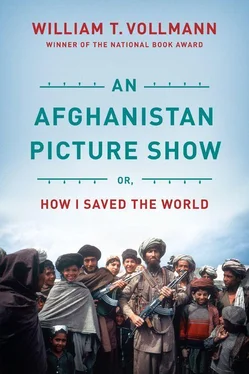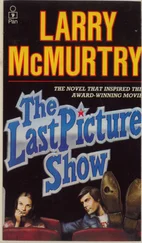THE POINT OF IT [2]
“There’s two hundred schools in our camps,” said Marie Sardie. “There’s thirty thousand schoolchildren going to school, and two thousand are girls.”
“That seems a little unbalanced.”
“No, response is very high; it’s higher than the local response. There’s more refugees who are going to school per total population than there is per total local population, and very much higher than in Afghanistan. The literacy rate’s extremely high. So we’re changing that structure. Many radical changes are now taking place in two years which would have taken fifty years in Afghanistan. Exposure to Western influence is very great; it’s too great. We’ve killed the tradition of Pathan food-gathering; here we give it to them. And we’ve killed the tradition of male education alone. Whether that’s a good thing or a bad thing, no one’s going to give a judgment on that.”
STATEMENT OF THE AFGHAN DOCTOR (HANGU CAMP)
“I think it will take some time to make the Afghan men understand that Afghan women are also human beings,” he said, looking out at the women at the well just outside the low baked-clay walls, where a great pale-leaved tree shaded them a little as they pumped water into old petroleum tins and milk tins, and their dresses were blue with orange flowers or red with yellow blossoms or orange or beige but they all wore veils, “and they also have the right to go anywhere they wish to get help, and they need to be educated. It will take the men some time. But a sudden change in their culture will be disastrous, because they will fight with their guns and everything.”

* Consider the simple economics of the project. He spent thousands on transportation and equipment, and raised hundreds.
† They haven’t.
‡ As was already mentioned, by 1982 Peshawar’s population had doubled since the invasion. So had that of the Kohat district to the south (178,000 locals, 178,000 refugees), where field teams of the International Rescue Committee operated their mobile medical units. These camps were closed to new arrivals, being already at their carrying capacity. Supplies of hygienic drinking water were a limiting factor: in Kohat there was at least one camp whose only water supply was a filthy trickle that dribbled onto a level space of gravel below the huts. That was also the latrine. Because it was so exposed to view, a refugee said, the women could not relieve themselves at all during the day. More refugees arrived and more were expected. New camps were established in the Northern Territory and down in Baluchistan, but many Afghans chose to remain here even though they could not register for the food allowances: everyone at least spoke their language in the North-West Frontier Province, and the factions had their offices in Peshawar. The cool mountains of the north were only a week’s walk for them and their grazing animals, and the Khyber Pass was a couple of hours away by bus. To the east, in the muggy farmland of the Punjab, stood Islamabad, the modern capital, where sometimes imported rocket launchers and cases of bullets could be bought, for increasingly inflated prices.
§ On my return, I went to half a dozen radio and TV stations, showing my photographs, carrying my stacks of tapes, but the general consensus was that they just keep breeding and getting massacred over there, and so what? — “The Little Brown People,” an American oil executive called them. It was as though he was speaking of sprites and fairies. — “They’re like children,” he said sadly. “I know. I’ve spent twenty years in Asia. The Little Brown People are charming really but they can’t think beyond today.”
‖ In my fund-raising ventures I set out two coffee cans. One said REFUGEESand the other said REBELS. How thoughtful I was! I remember my first time, when at the end of the evening I found that the refugees were now thirty dollars richer, and the rebels had gained nine dollars. Well, the amounts were modest, but at least, at last, I was accomplishing something! But, as it turned out, U.C. Berkeley charged me forty dollars for the use of the room.
a “We’ve now had a chance to give careful consideration to your book on Afghanistan,” wrote Houghton Mifflin in 1983. “Certainly your journey there was a remarkable one, as was your boldness in making it. Our problems with the manuscript are not so much with the keenness of your perceptions as with what we feel is the nature of your presentation … From our point of view … though the book might be well regarded by reviewers, we’d have a hard time finding a large enough audience for it to be able to publish in a way that would satisfy either you or us. I am therefore regretfully returning the manuscript to you …”
b For more on this, see the interview with Mary McMorrow, below.
8. “… DESCRIBED FORMALLY AS REFUGEE CAMPS …”: CORRUPTION (1982)
AFGHAN WOMAN: You are a tourist?
YOUNG MAN: NO, a fund-raiser.
AFGHAN WOMAN: You raise lots of money, or only a few thousand dollars?
YOUNG MAN: Probably just a few thousand dollars.
AFGHAN WOMAN: I think you should either really help us or not help us at all. You are not helping us.
An Afghanistan Picture Show [1]
Meanwhile his eyes were blinking, and his Afghanistan Picture Show, with which he would galvanize the world, was staring at him like the two little girls who stared at him between tents. One’s hair was combed, and she wore a clean white dress. The other was unkempt, with a dirty face and a faded wrinkled dress; she scratched an insect bite on her knee. Both were beautiful; both were shy. They stared and stared at him; they would never have enough of him. How strange he was! What did he want? Why had he come to them? Why was he so thin and pale and sweating? Something must be wrong with him. The two girls watched him, hoping that he would neither go away nor come closer. His Picture Show was staring at him like the two small boys who squatted down between the tent and the clay box that they lived in; they clasped hands over knees; they smiled, and between them was an empty tin that said: BUTTEROIL 99.8 % MILKFAT GIFT OF THE EUROPEAN ECONOMIC COMMUNITY, and another empty tin which had been made into a bucket stood on top of their house and the ground was packed baked cracked clay; it was staring like the square-eyed houses of clay watched him, thatch hanging down over their foreheads like the bangs of the refugee boys, and inside one of them the wide-faced boy who had lost his father to the Roos stared at the Young Man through brownish-green eyes, one hand pressed against his temple as if to help him stare even harder, and the Young Man thought: well, maybe I can do some good after all; maybe I can at least be a diversion; and behind the boy, a patterned blanket made a rainbow.
But he could not yet see what these things meant. He was too busy analyzing and solving once and for all (as he had all the other problems) the issue of
CORRUPTION
In effect, Marie Sardie was offering two arguments for the “extras”—the first being the expedient one that the situation might reverse itself of its own accord in the future, as with the Tibetan refugees, in which case hoarded “extras” might be needed; the second being that even with the “extras” malnutrition still existed, so the arbitrary curve could be drawn without being arbitrary at all, and the Young Man’s complicated doubts about omniscience and fairness became irrelevant: either people were malnourished or they were not.
Читать дальше













